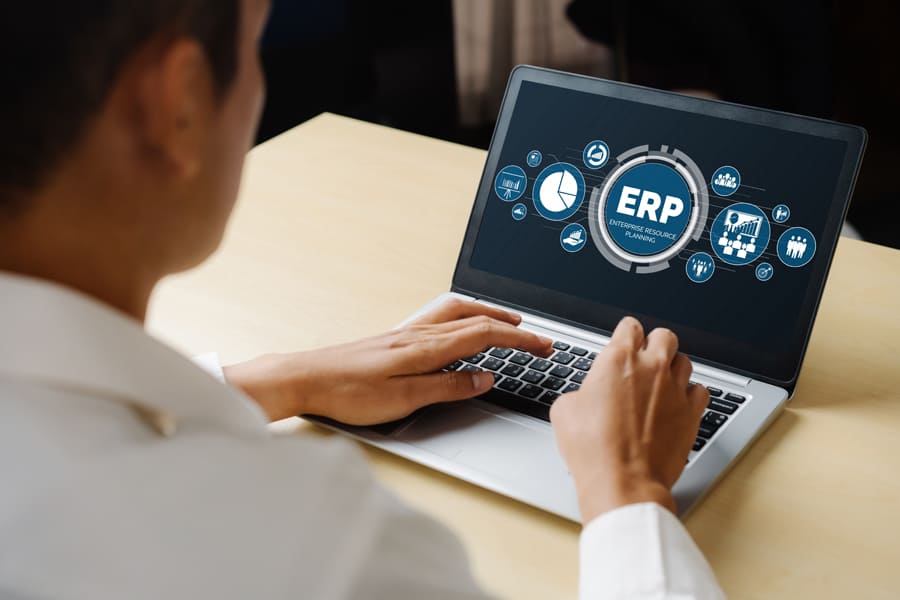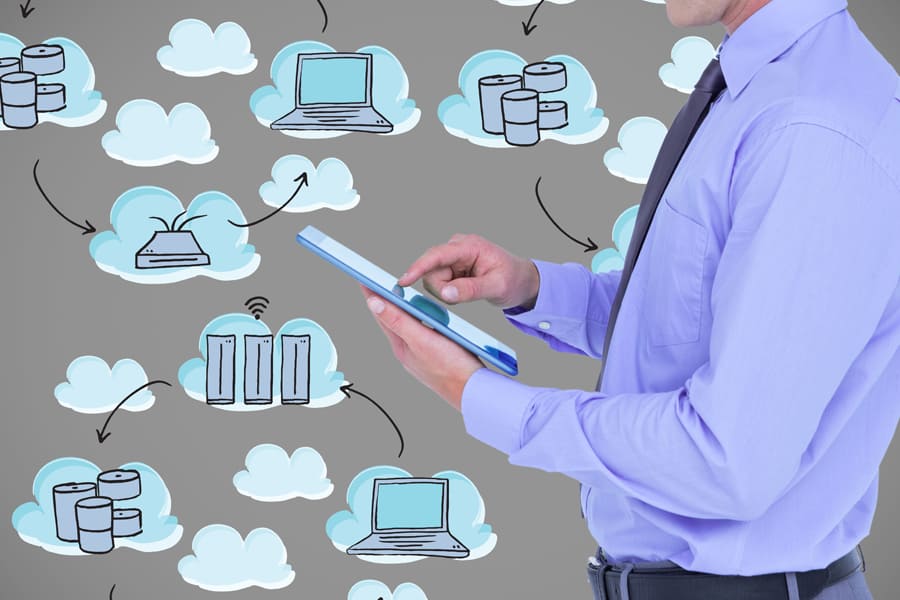Enterprise resource planning (ERP) systems are designed to streamline and centralize core business processes within an organization. These systems serve as a digital backbone, enabling efficient management of various business functions, such as finance, human resources, inventory, procurement, and more.
ERP software is a comprehensive, integrated system that helps businesses manage their resources more wisely and make data-driven decisions, ultimately driving improved efficiency and competitiveness.
The systems have become fundamental business management software for modern companies looking to enhance their operations and adapt to an increasingly data-centric and interconnected business environment.

Core functions of ERP systems
Enterprise resource planning software integrates and manages various business processes throughout the ERP life cycle. The systems can help you reduce costs, improve efficiency, and gain better visibility and control over your operations.
ERP systems also cover other vital areas such as supply chain management, inventory control, customer relationship management (CRM), and production planning. The overarching goal of ERP systems is to enhance overall efficiency, data accuracy, and decision-making by integrating various functions within an organization and providing a unified view of its operations.
Let’s review in detail each of the functions the ERP systems provide.
Finance and accounting
Finance and accounting form the necessary framework for budgeting and forecasting, managing cash flow, generating financial reports, and ultimately steering the business toward sustainable success. Effective financial management is essential to business growth because it provides critical insights into financial health and guides long-term decision-making.
Enterprise resource planning solutions provide a central database for all your finance and accounting software systems, offering real-time visibility into financial data.
They can automate a wide range of finance and accounting tasks, such as:
- Accounts payable — Automating the payment process by integrating with bank accounts and credit cards to save time and money while reducing common errors.
- Receivables management — Streamlining customer payment collection by sending invoices and reminders, which improves your cash position and reduces the need for manual processes.
- General ledger — Recording transactions and generating financial reports, leading to better accuracy and efficient reporting.
- Budgeting and forecasting — Creating and tracking budgets and forecasting future financial performance for better financial decisions.
- Tax compliance — Generating tax reports and filing taxes electronically to comply with tax laws and reduce the risk of penalties.
Integrating an ERP system into your financial and accounting tasks can make things run smoothly, reduce errors, and help you make smarter money choices. This ultimately contributes to the overall long-term financial health of your business.
Inventory and supply chain management
Inventory and supply chain management involves overseeing product lifecycle management, from procurement to distribution. This ensures that businesses always have the right inventory quantity to fulfill customer orders while reducing excess stock.
Some features that you can use include:
- Order processing — Receiving and processing orders automatically to improve order fulfillment accuracy and speed.
- Inventory tracking — Tracking inventory levels in real-time to always know what you have on hand and avoid stockouts and overstocking, which may create additional costs for your business.
- Warehouse management — Managing storage more efficiently by picking and packing orders and tracking inventory movements.
- Transportation management — Optimizing your transportation routes and schedules to minimize shipping costs and improve delivery times.
- Supplier relationship management — Managing supplier relationships by tracking orders, managing invoices, and evaluating performance.
ERP systems play a crucial role in streamlining inventory management and supply chain operations by efficiently managing these aspects. This results in significant cost savings and better customer satisfaction.
Human resources and payroll
Human resources (HR) and payroll nurture the most valuable asset in your business — your people. An effective HR system ensures talent acquisition, employee development, performance management, and employee engagement. By attracting, training, and retaining a skilled workforce, you have the right people in the right roles to drive productivity and innovation.

Enterprise systems can help you propel your business forward through the following HR functions:
- Employee management — Managing employee data such as contact information, job titles, and performance reviews. They also streamline HR processes and improve employee engagement.
- Time and attendance tracking — Tracking employee time and attendance data to ensure employees are paid accurately and comply with labor laws.
- Payroll processing — Automating payroll processing to save time and boost employee satisfaction.
- Benefits administration — Managing health insurance, retirement plans, and paid time off to streamline HR processes and improve employee satisfaction.
- Performance management — Monitoring employee performance and development to identify top performers and provide opportunities for advancement easily.
These features optimize your HR operations and contribute to the overall success of your business by ensuring you have the right people for the job. With the right ERP system, you can grow your business, boost employee engagement, and drive innovation through effective HR practices.
Customer relationship management
Efficient customer relationship management is crucial for business success. It emphasizes nurturing long-lasting relationships with your clients, ensuring customer satisfaction and a solid foundation for sustained growth and profitability.
ERP systems offer valuable support to CRM processes in several ways, including:
- Enhanced customer data management — They serve as a centralized hub for all customer information, spanning contact details, purchase history, and support interactions. This consolidation simplifies the work of CRM teams, enabling them to access and oversee customer data efficiently. The outcome is a more personalized and effective customer experience.
- Streamlined workflows — Enterprise planning systems can automate various CRM tasks, from lead generation and customer segmentation to campaign management. By automating these processes, CRM teams can redirect their efforts towards strategic activities, such as nurturing customer relationships and sealing deals.
- Real-time insights — CRM teams can gain real-time insights into customer behavior. This valuable data is a foundation for enhancing customer service, crafting targeted marketing initiatives, and pinpointing fresh sales prospects.
E-Commerce integrations between ERP and CRM systems can help your business to operate more efficiently and provide elevated levels of customer service. They unlock opportunities for more strategic and data-informed decision-making in the pursuit of customer satisfaction and business success.
Sales and marketing
Marketing and sales performance management are the primary drivers of revenue and growth. Marketing strategically positions your products or services in the market, targeting the right audience and creating brand awareness.
You can generate interest and engage potential customers through compelling messaging and tailored strategies to create a loyal brand following.
ERP systems help you to achieve this through:
- Opportunity management — Providing a single view of all sales opportunities, making it easy to see where leads are in the pipeline, qualify opportunities, and forecast sales.
- Qualification and scoring leads — Scoring and qualifying leads so you can narrow down the most promising opportunities.
- Pipeline management — Offering a visual representation of the sales pipeline, making it easy to see the progress of opportunities and identify those at risk of falling through.
- Sales performance management and forecasting — Using historical data to forecast future sales.
- Marketing campaign management — Integrating with marketing automation platforms to manage marketing campaigns, making it easy to analyze customer data and optimize campaign strategies.
With the help of historical data and integration with marketing automation platforms, these solutions help you optimize marketing campaigns and nurture your sales opportunities. By harnessing the capabilities of ERP, you can build lasting relationships with your customers.
Types of ERP systems
Different businesses have different needs in managing their core process. With an enterprise resource planning system, you have various options.
Whether you run a manufacturing company or a retail operation focused on inventory management, ERP solutions provide a comprehensive suite of tools to help you integrate and enhance your business processes.
Selecting the right ERP system and customizing it to align with your industry and company needs can help you manage resources and achieve greater operational efficiency.
Below we will discuss the main ERP implementations.
On-premise ERP systems
On-premise systems are the conventional choice, where the ERP software and hardware are located and maintained within the company’s physical premises. This type of system provides complete control and security over data and processes.
However, setting up an on-premise system may require a significant investment in infrastructure or trained personnel. On-premise systems are a good option if you’re looking for data control and have the resources to manage in-house servers.
They are ideal for large ecommerce businesses with substantial resources such as IT infrastructure and in-house IT teams to manage and maintain the system.
Ecommerce businesses in industries with strict regulatory compliance requirements, such as healthcare or finance, may also opt for on-premise systems to ensure the security of user data and compliance with industry standards.
Cloud-based ERP systems

With this option, the software and data are hosted in the cloud, and users access the system through the Internet. Cloud systems offer flexibility, scalability, and reduced IT overheads, so they’re suitable for businesses looking for cost-effective solutions and remote accessibility.
Cloud-based systems are a good choice for small and medium-sized ecommerce businesses with limited resources, as they offer scalability and cost-effectiveness and require minimal upfront investment.
Startups and rapidly growing ecommerce ventures can also benefit from the agility and flexibility of cloud-based solutions.
Hybrid ERP systems
Hybrid systems combine elements of both on-premise and cloud-based solutions. This allows businesses to keep critical data on-site for added security while utilizing cloud features for flexibility and accessibility. These systems are great if you’re looking for a mix of data control and convenience.
Ecommerce companies in the process of transitioning from on-premise to cloud can find hybrid solutions valuable. They can gradually move certain functions to the cloud while maintaining control over essential data.
Choosing the appropriate ERP depends on several considerations, such as your goals, budget, and resources. The right ERP strategy, whether it’s an on-premise solution, cloud-based, or hybrid, can go a long way in improving efficiency within any company.
Tips for choosing a cloud ERP system
Cloud-based ERP systems are often a preferred option when you need a flexible and scalable ERP solution.
When choosing a cloud system, consider the following factors:
- Your needs — Evaluate your business requirements to identify your desired features and functionality.
- Your budget — Cloud systems can cost a few hundred to several thousand dollars monthly. Set a budget before you start shopping.
- Reviews — Read reviews of different cloud systems to get feedback from other businesses that have used them.
- Features — Match the features and functionality of different cloud systems to ensure you get the best value for your money.
- Reputation — Choose a cloud ERP vendor with a good reputation for customer service and support and one that is secure and compliant with your industry regulations.
- Your future growth — Consider how your business may grow and choose a cloud system that can scale with you.
Take your time to thoroughly assess your needs, financial capacity, and the reputations of potential vendors. By making a well-informed choice, you can position your business for success in the long term.
Key features of ERP systems
ERP systems have several key features to help businesses automate tasks, streamline processes, and improve communication and collaboration.
Other key features of ERP systems include:
- Comprehensive reporting and analytics.
- Data security.
- Mobile accessibility.
- The ability to support multi-location or global operations.
These features help to improve efficiency, optimize operations, and gain a competitive edge in a dynamic business environment.
Integration of business processes

One of the most defining features of ERP systems is their ability to seamlessly integrate an array of modern enterprise processes. These systems remove the need for different software applications to manage tasks like inventory control, accounting, and order processing.
They define and enforce workflows that span multiple departments, ensuring that tasks and approvals are seamlessly routed from one step to another. This e-Commerce automation minimizes errors and bottlenecks and accelerates the flow of work.
For instance, when a customer order is received, an ERP system can trigger a series of interconnected actions, including inventory management, production scheduling, and order fulfillment.
Centralized data management
ERP systems are the centralized repository for critical data, ensuring uniformity and accessibility throughout the organization. This centralized data management eliminates the complexity of navigating numerous spreadsheets and guarantees data accuracy. By streamlining data access, ERP reduces the risk of data-related discrepancies.
These systems also enforce data consistency and accuracy by ensuring that all departments input and update information in a standardized manner. This minimizes mistakes and saves time on data reconciliation.
When a customer orders, the system ensures that the order information is consistent throughout the fulfillment process. This centralized approach to data management enhances data quality and simplifies data retrieval and reporting.
Real-time reporting and analytics
ERP reporting and embedded analytics help businesses with instant insights into their performance. Whether you seek up-to-the-minute sales figures or inventory levels, ERP provides timely data access and business intelligence. This feature enables trend analysis and equips businesses to fine-tune their strategies.
Enterprise planning systems often include powerful reporting and analytics tools that enable users to craft personalized reports, dashboards, and data visualizations. These tools integrate with the centralized data to uncover valuable insights and conduct real-time analysis.
You can set up alerts and notifications based on defined conditions, allowing you to react to important events or unusual occurrences swiftly.
Automation of routine tasks
ERP systems are adept at automating recurring tasks, from order processing to invoice generation. This automation minimizes the potential for human error and liberates employees from time-consuming, repetitive duties.
Such systems play a pivotal role in automating routine tasks, offering key benefits such as:
- Eliminating manual data entry — Capturing and storing data from diverse sources saves businesses valuable time and effort. For instance, they can automatically gather data from sales orders, purchase orders, and inventory transactions. The outcome is increased efficiency and a significant reduction in the risk of human error.
- Streamlining business processes — Streamlining business operations by automating the flow of information and tasks across various departments. For instance, when inventory levels dip below a predefined threshold, the system can generate a purchase order seamlessly. This automation enhances the efficiency of supply chain management, ultimately benefiting businesses.
- Automating repetitive tasks — Automating repetitive tasks integral to running a business. These include automatic generation of invoices, dispatch of payment reminders, and reconciliation of bank accounts. By delegating these repetitive responsibilities to systems, companies free their employees to concentrate on more strategic and value-added activities.
ERP integration in business operations promotes increased productivity, reduced error rates, and a heightened focus on tasks that drive business growth. This automation streamlines processes and saves valuable time and resources.
Customization and scalability
ERP systems are renowned for their adaptability and scalability. They can be tailored to align with the unique needs of a business, allowing the selection of specific modules and features.
Furthermore, they can grow with your company, accommodating the expansion of a startup or the evolving requirements of a large corporation’s business units. This inherent flexibility ensures that ERP remains a valuable and enduring asset, irrespective of how an organization transforms.
Advantages of ERP systems
The embrace of ERP systems has taken on a pivotal role, giving businesses a valuable edge by offering tools that fuel their growth and long-term sustainability.
The benefits of ERP systems span diverse aspects of an organization, from boosting operational efficiency and improving data accuracy to streamlining workflows.
ERP technology offers several advantages for businesses of all sizes.
Improved efficiency and productivity

ERP systems are highly regarded for their capacity to streamline business operations, resulting in increased efficiency. By centralizing various functions, they reduce repetitive tasks, minimize data entry errors, and lessen the need for manual processes.
This automation speeds up processes and allows employees to focus on value-adding tasks rather than routine data management. Moreover, real-time access to data ensures that employees always have the most current information, facilitating faster response times and smoother operations.
Enhanced decision-making and strategic planning
ERP systems present abundant data that can significantly improve decision-making and strategic planning in everyday business processes. With real-time reporting and analytics, businesses gain valuable insights into their performance.
They can also identify emerging trends and pinpoint areas requiring enhancement. This gives organizations the tools to adapt and refine their strategies for sustainable growth.
Increased collaboration and communication
Effective communication and collaboration are crucial for business success, and ERP systems are pivotal in promoting these qualities. By centralizing data in one system, employees from different departments can easily access shared information.
This eradicates barriers and encourages collaboration, making coordinating efforts and sharing insights easier. Moreover, integrating various functions, like sales, inventory, and customer service, facilitates more transparent communication within and outside the organization.
Better customer service and satisfaction
Enterprise resource planning systems provide a comprehensive view of customer data, allowing businesses to understand client preferences, purchase history, and service interactions. This helps in delivering personalized services and resolving issues promptly.
The systems also enhance inventory management, ensuring products are in stock when customers need them. This reduces backorder delays and improves order fulfillment, increasing customer satisfaction.
In addition to that, streamlined order processing and automated invoicing reduce errors and improve billing accuracy, which is crucial for customer trust.
Cost savings and return on investment
ERP systems can lead to significant cost savings and a compelling return on investment (ROI). They reduce operational costs by automating routine tasks, reducing errors, and optimizing inventory management. Plus, the improved decision-making can lead to more efficient resource allocation.
While implementing an ERP system may initially require a significant investment, the long-term benefits of cost savings and ROI are often substantial. Think of it as a strategic investment that yields returns by enhancing efficiency, cutting expenses, and fueling overall business growth.
Future trends and opportunities in ERP systems
Enterprise resource planning systems are continually evolving to meet the changing needs of businesses.
Some future trends and opportunities include:
- Artificial intelligence and machine learning integration — AI and machine learning in ERP systems are set to revolutionize businesses’ operations. These technologies won’t just handle mundane tasks but also delve into historical data, unveiling insights and robotic process automation.
- Advanced cloud-based accessibility — The transition toward cloud-based systems shows no signs of slowing down. This shift allows businesses to easily adjust their resource allocation, reducing the financial burden of maintaining physical servers.
- Internet of Things (IoT) and real-time data — IoT integration with business software will provide businesses with real-time data from interconnected devices and sensors. This data can be used for predictive maintenance, ensuring equipment is serviced before breaking down. It can also be valuable for tracking product location in the supply chain, which enhances overall efficiency.
- Enhanced security measures — The increasing frequency of cyber threats necessitates robust security measures within business systems. This includes multi-factor authentication, data encryption, and continuous monitoring to safeguard sensitive business data.
- Mobile applications — The advancement of mobile applications means that users will perform complex tasks on smartphones and tablets. This will be particularly valuable for field staff, sales teams, and managers needing critical information and making decisions while moving.
- User-friendly interfaces — ERP systems will prioritize user experience by offering intuitive interfaces. This includes simplified navigation, user-friendly designs, and reduced complexity. Such enhancements will reduce the learning curve for employees and increase their overall productivity.
- Customization and scalability — Future systems will be highly customizable and scalable. This means businesses can tailor the software to meet their unique requirements and adapt as they grow. The flexibility ensures that modern solutions can evolve with the organization’s changing needs.
- Blockchain integration — Blockchain technology will add more transparency and security. This will provide an immutable ledger for financial transactions and supply chain processes, offering complete traceability and reducing the risk of fraud.
- Green ERP for sustainability — Sustainability is becoming a top business priority. Future systems will help track and minimize environmental impact, optimize resource use, and reduce waste.
- Global expansion and localization — As businesses expand globally, ERP systems must support multiple languages, currencies, and tax regulations so they can operate in diverse markets and comply with local laws.
Staying up to date with these trends will be essential for leveraging the full potential of ERP solutions. Businesses that embrace these opportunities are poised for greater efficiency and success in the future.
Frequently asked questions
What is an ERP system, and how does it work?
An enterprise resource planning (ERP) system is a comprehensive suite of integrated management systems and applications that oversees fundamental business processes. These processes include finance, project management, and manufacturing resource planning.
What are the core functions of ERP systems?
They help to integrate and manage key business functions. These include finance and accounting, inventory and supply chain management, human resources and payroll, customer relationship management, and sales and marketing.
What are the advantages of ERP systems for businesses?
They offer enhanced efficiency and productivity, real-time data for informed decision-making, and increased collaboration and communication among different departments.